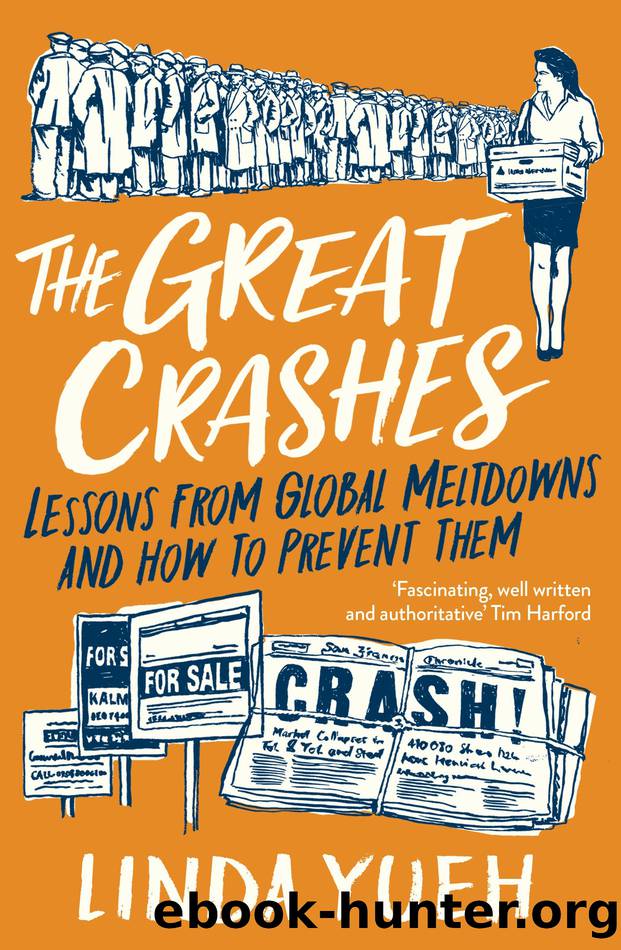The Great Crashes by Linda Yueh

Author:Linda Yueh [Yueh, Linda]
Language: eng
Format: epub
ISBN: 9780241988091
Publisher: Penguin Books Ltd
Published: 2020-04-02T00:00:00+00:00
It was this phrase, âwhatever it takesâ, that signalled the end of the acute phase of the euro crisis. I was at Lancaster House covering the euro crisis for Bloomberg TV, and the impact of that speech was seen immediately in calmer financial markets. After the speech, bond yields started to come down. Markets, generally speaking, do not bet against a central bank. The ECB was almost an exception due to its rather unusual set-up. Unlike the Fed or the Bank of England, the ECB was constrained in deploying its massive firepower. But when Draghi said that it would do âwhatever it takesâ, the markets believed him.
The intent was clear, although the details were a little vague. US Treasury Secretary Timothy Geithner visited the ECB afterwards and observed of Draghiâs speech: â[H]e decided to add to his remarks, and off-the-cuff basically made a bunch of statements like âweâll do whatever it takesâ. Ridiculous ⦠totally impromptu ⦠Draghi at this point, he had no plan. He had made this sort of naked statement.â20
Nevertheless, Merkel, Monti and the newly elected French president, François Hollande, issued a joint statement backing the irreversibility of the euro. The Bundesbank was against the idea of the ECB stabilizing bond markets and cast the sole vote against Draghiâs new emergency bond-buying programme, Outright Monetary Transactions, at the ECB Governing Councilâs September meeting. But Merkel and her finance minister, Wolfgang Schäuble, backed Draghi. The risk of Spain itself needing a rescue could precipitate the break-up of the euro if its fourth-largest economy was shut out of markets. Markets could come for its highly indebted third-largest economy, Italy, next; even France wasnât safe.
Therefore, the ECB became the lender of last resort, a role until then played by other central banks. But it was a conditional role. Outright Monetary Transactions would operate to stabilize a countryâs debt only if it was already subject to an ESM rescue programme. In the end, the measure was never used in the euro crisis. But, as Draghi said, its existence was enough.
Even now, the crisis was not over.
In the summer of 2012, Cyprus became the fifth euro-area country to request a rescue from the eurozone. It had an outsized banking sector, some six and a half times the size of its economy, which was in crisis owing to its holdings of Greek debt. The write-down of Greek debt led to more than â¬4 billion of losses for banks in Cyprus. To give context, thatâs more than 22 per cent of Cypriot GDP. Cypriot banks held large amounts of deposits from Russians and other foreigners, which made the ECB reluctant to assist them because most of the benefits would have gone to non-residents.
It took until March 2013 to agree the terms. By this point, the eurozone had pivoted to rescuing the banking system directly from the ESM. Despite the reservations of the ECB, the â¬10 billion Cypriot bailout was the first full rescue package by the ESM, though the IMF contributed â¬1 billion to the total.
Download
This site does not store any files on its server. We only index and link to content provided by other sites. Please contact the content providers to delete copyright contents if any and email us, we'll remove relevant links or contents immediately.
International Integration of the Brazilian Economy by Elias C. Grivoyannis(111057)
The Radium Girls by Kate Moore(12026)
Turbulence by E. J. Noyes(8047)
Nudge - Improving Decisions about Health, Wealth, and Happiness by Thaler Sunstein(7706)
The Black Swan by Nassim Nicholas Taleb(7128)
Rich Dad Poor Dad by Robert T. Kiyosaki(6631)
Pioneering Portfolio Management by David F. Swensen(6300)
Man-made Catastrophes and Risk Information Concealment by Dmitry Chernov & Didier Sornette(6019)
Zero to One by Peter Thiel(5798)
Secrecy World by Jake Bernstein(4751)
Millionaire: The Philanderer, Gambler, and Duelist Who Invented Modern Finance by Janet Gleeson(4478)
The Age of Surveillance Capitalism by Shoshana Zuboff(4291)
Skin in the Game by Nassim Nicholas Taleb(4248)
The Money Culture by Michael Lewis(4205)
Bullshit Jobs by David Graeber(4190)
Skin in the Game: Hidden Asymmetries in Daily Life by Nassim Nicholas Taleb(4004)
The Dhandho Investor by Mohnish Pabrai(3764)
The Wisdom of Finance by Mihir Desai(3746)
Blockchain Basics by Daniel Drescher(3580)
